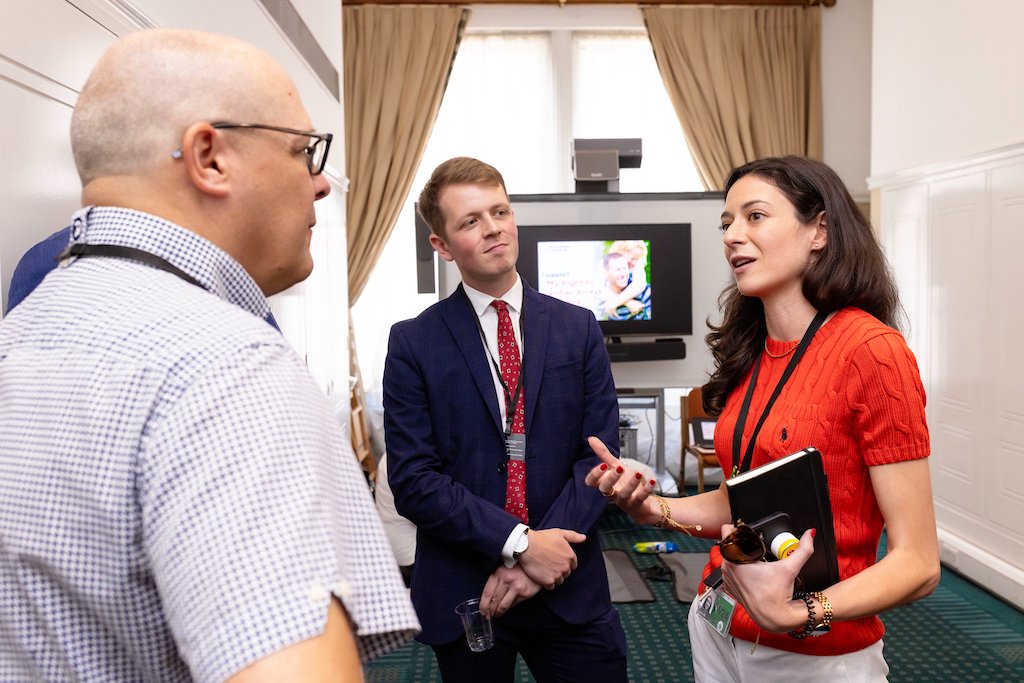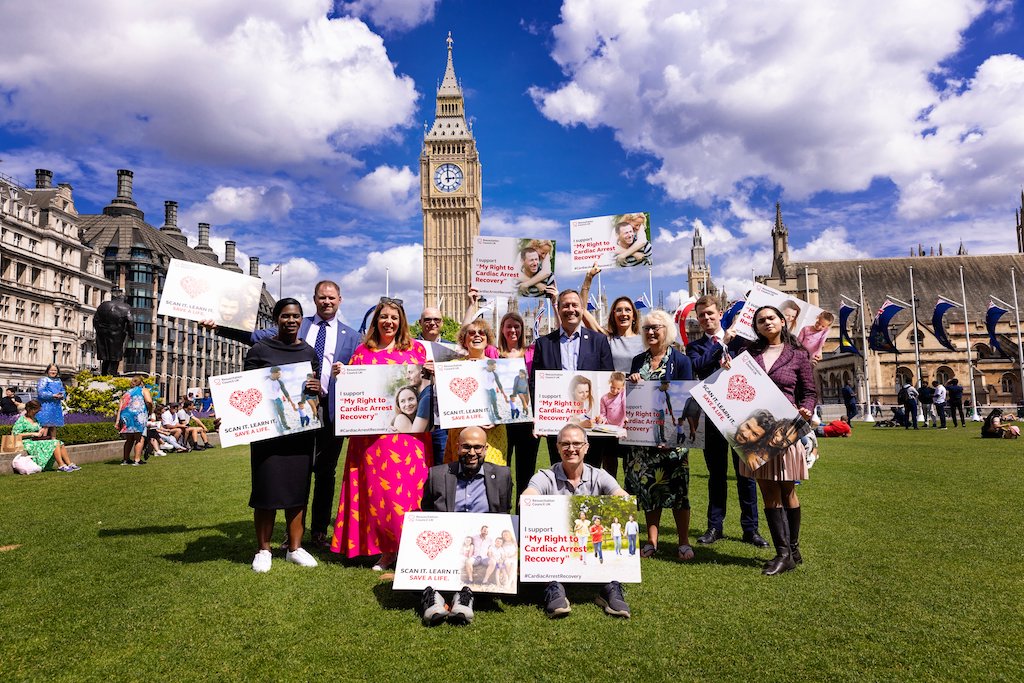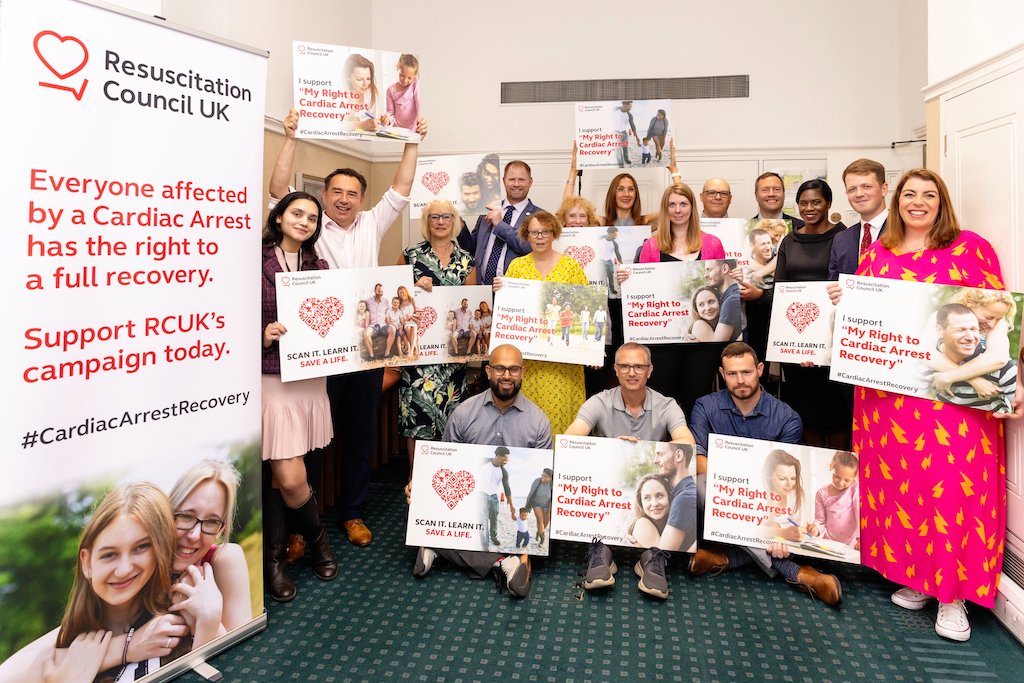Like many, I came suddenly to the bizarre world of cardiac arrest survivorship in 2014. Before my event, I doubt that I knew what it was, and my only knowledge probably stemmed from the shocking event that unfolded when Fabrice Muamba had his SCA on TV two years prior.
My experience until I left hospital had been first class – I was alive, wasn’t I? Little did I know what life after cardiac arrest was to be like. It didn’t take long to realise there was a significant gulf between the care I received pre and post-discharge; frustratingly, this still seems to be the case for many. I have talked about this on many occasions going back to when I first realised it wasn’t just me that was left to my own devices post-discharge.
My Right To Cardiac Arrest Recovery
So, as a survivor and someone who is passionate about improving cardiac arrest care in the UK, I recently had the privilege of joining fellow SCA UK trustees (Charlotte and Dr Keeble) and members as part of a delegation from the Resuscitation Council UK for their new campaign, “My Right to Cardiac Arrest Recovery.” The campaign aims to raise awareness about the absence of an official care pathway for cardiac arrest survivors and to emphasise the need for equal care similar to what patients with other serious health issues like stroke and heart attack* receive. This article recounts my experience of going to Westminster to meet and greet MPs and those from the House of Lords, highlighting the importance of this first step on our journey towards achieving our goal.
*The problems are different – a heart attack is a plumbing, and a cardiac arrest electrical
The Need for a Cardiac Arrest Care Pathway

Cardiac arrest is a life-threatening condition affecting thousands of people in the UK annually. Surviving a cardiac arrest is remarkable but is only the beginning of a challenging recovery journey. Unfortunately, unlike stroke or heart attack, there is currently no standardised care pathway for cardiac arrest survivors, leaving many individuals and their families to navigate the often challenging recovery alone. This lack of structured care and support can lead to suboptimal outcomes and disparities in access to essential services.
The Powers That Be

The visit to Westminster was a crucial opportunity for our delegation to engage with policymakers and key stakeholders who have the power to shape healthcare policies and drive positive change. Our objective was to ensure that cardiac arrest recovery receives the attention it deserves and that survivors and co-survivors are granted the same level of care and support as those with other serious health conditions.
The event was a significant occasion, where we had the chance to meet and greet Members of Parliament, Lords, and Peers from the House of Lords. We shared our personal stories, experiences, and the pressing need for an official care pathway for cardiac arrest survivors. Our aim was to raise awareness of the system’s gaps and stress the importance of equality in healthcare.
Raising Awareness for Equal Care
During our discussions, we emphasised the significance of equality in healthcare provision. Just as stroke and cancer patients have well-defined care pathways that guide them from diagnosis to recovery, cardiac arrest survivors deserve a similar framework. This includes access to specialised cardiac rehabilitation programs, psychological support, and long-term follow-up care to mitigate the physical, emotional, and psychological challenges they face.
We also highlighted the importance of public education on cardiac arrest recognition and bystander CPR training. By raising awareness about the signs of cardiac arrest and empowering the public to respond swiftly, we can improve survival rates and decrease the long-term consequences of the condition.
A Long Journey Ahead
While our visit to Westminster was a crucial step forward, we recognise that achieving our goal of an official care pathway for cardiac arrest survivors will be a long journey. However, we remain committed to advocating for change and fighting for the rights of survivors and co-survivors.
We will continue collaborating with the Resuscitation Council UK, policymakers, healthcare professionals, and other stakeholders to develop and implement a comprehensive cardiac arrest care pathway. We will actively engage with the powers that be to keep the issue on their agenda and encourage them to support policies prioritising equal care for cardiac arrest survivors.
Conclusion

Our journey to achieve equality in cardiac arrest care has begun, and the visit to Westminster was a significant first step in this campaign. As we embark on this journey, we urge policymakers, healthcare professionals, and the public to join us in advocating for the rights of cardiac arrest survivors. It is essential to recognise that cardiac arrest recovery is not just about surviving the initial event; it is about enabling individuals to regain their quality of life and supporting them in their physical, emotional, and psychological healing.
To achieve our vision of care, it is crucial to address several key aspects:
- Standardised Care Pathway: We will continue to work towards developing an official care pathway for cardiac arrest survivors, outlining the necessary steps from pre-discharge assessments to long-term rehabilitation and follow-up. This pathway should encompass specialised cardiac rehabilitation programs, mental health support, and access to appropriate healthcare professionals who understand the unique challenges faced by survivors and co-survivors.
- Rehabilitation Programs: Cardiac rehabilitation is vital for survivors to regain their strength, endurance, and overall well-being. We will advocate for increased availability and accessibility of cardiac rehabilitation services across the country, ensuring that survivors have access to the resources and support necessary for their recovery, regardless of the cause of their cardiac arrest.
- Psychological Support: Surviving a cardiac arrest can be a traumatic experience for the survivor and their loved ones. Mental health support, including counselling and therapy, should be integral to the care pathway. We will advocate for increased funding and resources to provide comprehensive psychological support tailored to the needs of cardiac arrest survivors and their families.
- Long-term Follow-up Care: Cardiac arrest survivors often face long-term complications and potential recurrence risks. It is essential to establish a system for long-term follow-up care, including regular check-ups, monitoring of cardiac health, and education on risk reduction strategies. By implementing comprehensive follow-up protocols, we can minimize the chances of recurrence and provide ongoing support for survivors.
- Public Education and Awareness: We will continue to raise public awareness about cardiac arrest, its warning signs, and the importance of immediate bystander CPR. Educating the public can empower individuals to take swift action during emergencies, increasing the chances of survival and minimizing the potential consequences of cardiac arrest.
We must continue to advocate for cardiac arrest survivors’ rights, ensuring they receive the same level of care and support as individuals with other serious health conditions. Together with the Resuscitation Council UK and other stakeholders, we will strive to develop and implement a comprehensive care pathway that addresses the unique needs of cardiac arrest survivors.
Our collective responsibility is to create a healthcare system that recognises the importance of cardiac arrest recovery and provides survivors and co-survivors with the resources, support, and compassion they need to rebuild their lives. Through ongoing collaboration, education, and advocacy, we can make significant strides towards achieving equity in cardiac arrest care and improving the lives of countless individuals across the UK.
Petition
Show your support for cardiac arrest survivors today by signing and sharing the RCUK petition to improve post-cardiac arrest care on the NHS.
Petition to improve cardiac arrest recovery
The Best Remedy
On my day out to London, I purchased a coffee and some lunch, which came to the princely sum of £10!
Are you tired of spending your hard-earned money on overpriced coffee and uninspiring sandwiches? Well, I’ve got a deal for you that will tickle your taste buds and warm your heart! Instead of shelling out pounds on a lacklustre latte and a soggy sandwich, why not invest in an experience that truly matters?
For the very same £10 I spent in London, you can get a ticket to our “Survive and Thrive” event and embark on a journey filled with laughter, inspiration, and cardiac arrest survival stories that will leave you feeling more alive than ever before! Trust me, the stories you’ll hear at this event are way more uplifting than any coffee you’ve ever sipped or sandwich you’ve ever devoured in London. So, skip the bland bites and join us for an event that will nourish your soul and make you appreciate the extraordinary triumphs of life. Don’t miss out because surviving and thriving beats sipping and chewing any day!

After our first meet-up in February 2015, I realised I was not alone. It was the first time since my cardiac arrest the previous year that I had spoken face-to-face with someone who had experienced what I had. This was also true for my wife, who also happened to be my lifesaver. From that meet-up, the idea of SCA UK was born. Since then, we have achieved a considerable amount, primarily providing information, resources and support to others in a similar situation but also raising the profile of survivorship and the need for better post-discharge care. We are starting to get traction in this, and with the formation of the charity, I genuinely believe we have a bright future ahead and will make a significant difference in the lives of many who join our ranks.

